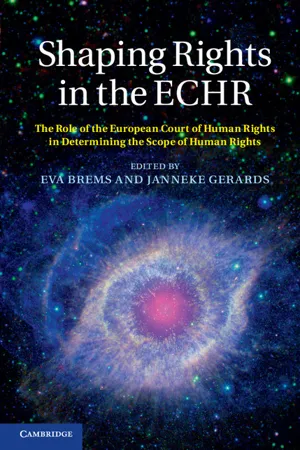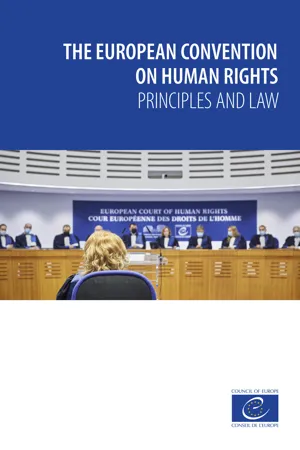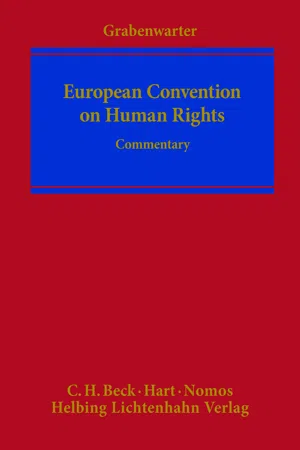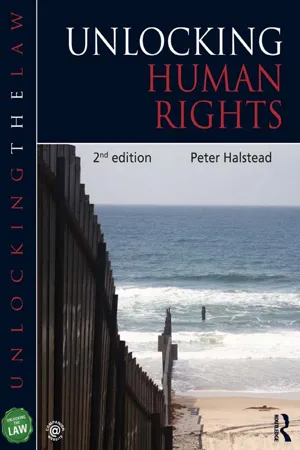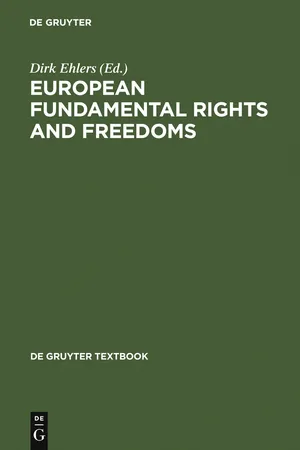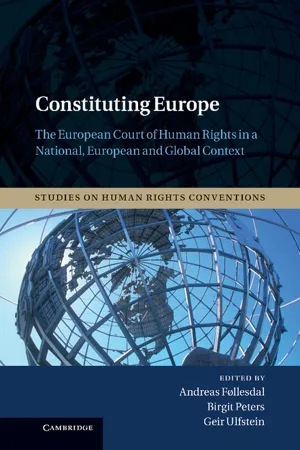Law
Article 6 echr
Article 6 of the European Convention on Human Rights (ECHR) guarantees the right to a fair trial. It encompasses several key principles, including the right to a public hearing, the right to be presumed innocent until proven guilty, and the right to legal assistance. This article is fundamental in safeguarding individuals' rights within the legal system.
Written by Perlego with AI-assistance
Related key terms
1 of 5
12 Key excerpts on "Article 6 echr"
- eBook - PDF
Shaping Rights in the ECHR
The Role of the European Court of Human Rights in Determining the Scope of Human Rights
- Eva Brems, Janneke Gerards(Authors)
- 2014(Publication Date)
- Cambridge University Press(Publisher)
36. 36 ECtHR (GC), Escoubet v. Belgium, 28 October 1999, paras 33–9. 37 Maaouia, note 19 above, at para. 39. 38 ECtHR, Eckle v. Germany, 15 July 1982, para. 73. 39 ECtHR, John Murray v. United Kingdom, 8 February 1996, para. 62; ECtHR (GC), Salduz v. Turkey, 27 November 2008, para. 50. See also in the same sense ECtHR, Imbrioscia v. Switzerland, 24 November 1993, para. 36. the right to a fair trial & its multiple manifestations 301 initial stages of the criminal proceedings ‘depends on the special features of the proceedings involved and on the circumstance of the case’, 40 but also that the rights guaranteed by Article 6(3), insofar as they are applied in the initial stages, ‘may be subject to restrictions for good cause’. 41 2.2 Right to a court Probably the most spectacular example of a wide interpretation of Article 6 is offered by the Golder case (1975). In that case the Court read into Article 6(1) a right to a court, of which the right of access to a court is an essential aspect. The Court reached its conclusion on the basis of extensive reasoning, in which it relied on the rules of interpretation contained in Articles 31 to 33 of the Vienna Convention of 23 May 1969 on the Law of Treaties. It relied in particular on the ‘general rule’ under Article 31: it took into account the text of Article 6(1) (which is not necessarily limited to pending proceedings, but can also be understood as implying a right to institute proceedings), the preamble to the ECHR (which refers to the rule of law), the object and purpose of the ECHR (intended to protect human rights), and two relevant general principles of law, namely that which requires a civil claim to be capable of being submitted to a judge and that which forbids the denial of justice. The Court concluded that the right of access is an inherent element of the right stated in Article 6(1). - eBook - PDF
Obstacles to Fairness in Criminal Proceedings
Individual Rights and Institutional Forms
- John D Jackson, Sarah J Summers, John D Jackson, Sarah J Summers(Authors)
- 2018(Publication Date)
- Hart Publishing(Publisher)
A. Various Ambits of the Right to a Fair Trial Article 6 echr was relatively recently given a title, ‘right to a fair trial’, words that also figure in the text of Article 6(1) ECHR. The title is without normative value as it was not the subject of an additional protocol but was added more than half a century after the adoption of the text of the Convention. The term ‘right to a fair trial’ can be understood as encompassing at least three circles of meaning. The narrowest one corresponds to the text of Article 6(1) ECHR and is limited to that text with the exclusion of more specific guarantees set out in the Article. Then we can distinguish a wider one which includes all the specific rights of the accused, in other words, and in accordance with the title, a notion which refers to all the guarantees of Article 6 echr, including also Articles 2–4 of Protocol No 7 ECHR. Finally, in a very broad sense, the notion of fair trial could be understood as including all the guarantees which protect individuals in procedural matters, includ-ing those attaching to restriction and deprivation of liberty in the sense of Article 5 ECHR or the protection of private life as set out in Article 8 ECHR. I shall not comment further on this very wide approach which is too nebulous to allow precise delineation or be of any use. When I wrote, over 10 years ago, about human rights in criminal proceedings, 9 I included a chapter entitled ‘The General Right to a Fair Trial’. Then I added chap-ters each for Article 6(2) ECHR and the five sub-paragraphs in 6(3) ECHR. It meant that I gave weight to the narrowest ambit of the term. Today, I might abandon this structure. It may be useful for the reader, but I’m afraid it is not entirely correct, from a systematic perspective. In fact, it is rather obvious that ‘fair trial’ is a superordinate concept which encompasses the specific guarantees set out in Article 6(3) ECHR. - Carla M. Buckley, Krešimir Kamber, Pamela McCormick, David J. Harris(Authors)
- 2022(Publication Date)
- Council of Europe(Publisher)
European Yearbook on Human Rights 295, doi: 10.1017/9781780689562.014.Guinchard S. et al. (2019), Droit processuel: droits fondamentaux du procès, 10th edition, Dalloz, Paris.Leanza P. and Pridal O. (2014), The right to a fair trial: Article 6 of the European Convention on Human Rights, Wolters Kluwer, Alphen aan den Rijn.Lemmens P. (2013), “The right to a fair trial and its multiple manifestations: Article 6 (1) ECHR”, in Brems E. and Gerards J. (eds), Shaping rights in the ECHR: The role of the European Court of Human Rights in determining the scope of human rights, 294, Cambridge University Press, Cambridge, DOI: https://doi.org/10.1017/CBO9781107337923.018 .Lemmens K. et al. (eds) (2019), Human rights with a human touch: liber amicorum Paul Lemmens, Intersentia, Antwerp.McBride J., (2018)Human rights and criminal procedure: The case law of the EuropeanCourt of Human Rights, 2nd edition, Council of Europe.Pinto de Albuquerque P. and Wojtyczek K. (eds) (2019), Judicial Power in a Globalized World: liber amicorum Vincent De Gaetano, Springer, Cham, DOI: https://doi.org/10.1007/978-3-030-20744-1Pivaty A. (2018), “The right to custodial legal assistance in Europe: in search for the rationales”, 26 (1) European Journal of Crime, Criminal Law and Criminal Justice 62, DOI: https://doi.org/10.1163/15718174-02601004 .Puéchavy M. (ed.) (2012), Le principe ne bis in idem, Anthémis, Wavre.Sidhu O. (2017), The concept of equality of arms in criminal proceedings under Article 6 of the European Convention on Human Rights; Intersentia, Cambridge, DOI: https://doi.org/10.1017/9781780687452 .Spanó R. et al. (eds) (2020), Fair Trial: Regional and International Perspectives: liber amicorum Linos-Alexandre Sicilianos, Anthémis, Wavre.Turković K. and Kamber K. (2016), “One face of human rights for two faces of criminal justice: A European perspective” in Ackerman B. et al. (eds), Visions of justice: liber amicorum Mirjan Damaška- eBook - PDF
European Convention on Human Rights
Commentary
- Christoph Grabenwarter(Author)
- 2014(Publication Date)
- Beck/Hart(Publisher)
The guarantee of Article 6 is based on the idea of the separation of powers and the independence of the judiciary. Hence, it is not surprising that comparable rights are laid down in Articles 10 and 11 of the UDHR, in Article 14 of the ICCPR and in Article 8 of the ACHR. 1 Guarantees comparable to the one under Article 6 can also be found in constitutions of member states and in EU law. Articles 47 and 48 of the EU-Charta contain corresponding guarantees, however, without the limitation of the scope of application of Article 6. According to the case law of the CJEU the principle of a fair trial, such as the requirement of effective judicial control as laid down in Article 6 and 13 of the Convention, reflects a general principle of law. 2 The idea of the separation of powers in a state is particularly shown in the obligation to comply with decisions of administrative tribunals. 3 The Court determined in this respect that administrative authorities form one element of a state who is subject to the rule of law, and that their interests thus coincide with the need for the proper administration of justice. Where administrative authorities refuse or fail to comply with judgments, or delay doing so, the guarantees under Article 6 afforded during the judicial phase of proceedings are rendered devoid of purpose. 4 1 Cf. Nowak , CCPR Commentary, 2 nd ed., 2005, Article 14 m.n. 1. 2 E.g. CJEU, 15.5.1986, Case 222/84 ( Johnston ), § 18. 3 ECtHR, 13/01/2011, Ku ¨bler v GER, No. 32715/06, § 66; this also applies in respect of interim measures. 4 ECtHR, 19/03/1997, Hornsby v GRE, No. 18357/91, § 40 et seq. Article 6 – Right to a fair trial Art. 6 1 100 II. Scope of protection 2 Article 6 applies to proceedings concerning ‘ civil rights and obligations ’ as well as concerning ‘ criminal charge[s] ’ . - Alastair Mowbray(Author)
- 2004(Publication Date)
- Hart Publishing(Publisher)
5 Article 6: Right to a fair trial T his elaborate provision specifies that: (1) In the determination of his civil rights and obligations or of any criminal charge against him, everyone is entitled to a fair and public hearing within a reasonable time by an independent and impartial tribunal established by law. Judgment shall be pro-nounced publicly but the press and public may be excluded from all or part of the trial in the interests of morals, public order or national security in a democratic society, where the interests of juveniles or the protection of the private life of the parties so require, or to the extent strictly necessary in the opinion of the court in special cir-cumstances where publicity would prejudice the interests of justice. (2) Everyone charged with a criminal offence shall be presumed innocent until proved guilty according to law. (3) Everyone charged with a criminal offence has the following minimum rights: (a) to be informed promptly, in a language which he understands and in detail, of the nature and causes of the accusation against him; (b) to have adequate time and facilities for the preparation of his defence; (c) to defend himself in person or through legal assistance of his own choosing or, if he has not sufficient means to pay for legal assistance, to be given it free when the interests of justice so require; (d) to examine or have examined witnesses against him and to obtain the atten-dance and examination of witnesses on his behalf under the same conditions as witnesses against him; (e) to have the free assistance of an interpreter if he cannot understand or speak the language used in court. Article 6 is the source of the largest number of complaints made to the Court. 1 This can be explained, in part, by the scope of the provision which seeks to guar-antee fair trials for both civil and criminal cases.- eBook - PDF
Human Rights Brought Home
Socio-Legal Perspectives of Human Rights in the National Context
- Simon Halliday, Patrick Schmidt, Simon Halliday, Patrick Schmidt(Authors)
- 2004(Publication Date)
- Hart Publishing(Publisher)
51 In essence, the suspect was informed of her right, but there was a concern that she should be dis-suaded from exercising it. The Raffarin administration has now gone fur-ther in repealing this provision altogether. DEFENCE RIGHTS AND THE CULTURE OF JUDICIAL SUPERVISION It is in the treatment of pre-trial defence rights in particular that we see demonstrated most clearly the tensions between the development of ECHR guarantees and those contained within domestic French criminal procedure. Although expressed as the right to a fair trial, Article 6 guarantees apply well before the accused ever reaches the courtroom. The jurisprudence of the European Court recognises that the trial cannot be treated as a discrete phase in the criminal process, unaffected by the processes which precede it. A denial of defence rights at the pre-trial stage is likely to prejudice the prepa-ration of the defence case and so the fairness of the trial. Thus, Article 6 guarantees have been held to apply to the individual from the point of charge. This has been interpreted in a substantive rather than formal way, looking at the realities of the procedure rather than the appearance or offi-cial terminology. 52 Once the individual is under investigation, her position has been substantially affected 53 and she is, at that point, in need of and entitled to the protection of Article 6 — even if a formal charge or indict-ment is never brought. 54 This protection includes access to custodial legal advice as it is ‘fundamental to the preparation of [an accused person’s] defence’ 55 which in turn forms part of the fair trial requirements which are Human Rights and French Criminal Justice 197 51 It is interesting that a right which is generally regarded as being for the protection of the sus-pect, is seen in the reverse way in France, as being contrary to her interests. - eBook - ePub
- Peter Halstead(Author)
- 2014(Publication Date)
- Routledge(Publisher)
In the determination of his civil rights and obligations or of any criminal charge against him, everyone is entitled to a fair and public hearing within a reasonable time by an independent and impartial tribunal established by law. Judgment shall be pronounced publicly but the press and public may be excluded from all or part of the trial in the interests of morals, public order or national security in a democratic society, where the interests of juveniles or the protection of the private life of the parties so require, or to the extent strictly necessary in the opinion of the court in special circumstances where publicity would prejudice the interests of justice.’One reason why the Convention is so important is that it has forced re-examination of English law in light of continental civil law legal systems, thus shining a spotlight into situations where English law may have become stultified or in need of modernisation or reconsideration. As indicated previously, although the detail in Articles 6(2) and 6(3) deals exclusively with criminal matters, Article 6(1) does make it clear that the Article as a whole encompasses ‘civil rights and obligations’ which also come within the protection of the Article’s insistence on ‘fair and public hearings … within a reasonable time by an independent and impartial tribunal established by law’.7.5.1 Excluded hearingsIt is important to note that the European Court of Human Rights is not to be used as a means simply of trying to obtain a rehearing of domestic case law when litigants or accused citizens are unhappy with the outcome. The role of the European Court is to examine whether the previous proceedings were fair and complied with the requirements of Article 6 when taken as a whole. This means that the Court will not formulate conclusions as to whether appropriate sentences have been reached, or even whether a conviction was safe.The core of Article 6(1) is that ‘everyone is entitled to a fair and public hearing within a reasonable time by an independent and impartial tribunal established by law’. However, some tribunals may not come within the ambit of the article. - eBook - PDF
The EU Charter of Fundamental Rights
A Commentary
- Steve Peers, Tamara Hervey, Jeff Kenner, Angela Ward, Steve Peers, Tamara Hervey, Jeff Kenner, Angela Ward(Authors)
- 2014(Publication Date)
- Hart/Beck(Publisher)
261 Restrictions on the right must be counterbalanced by procedural protections; for example, a conviction cannot be based either solely or to a decisive extent on evidence from anonymous witnesses. 262 The ECtHR has also held that Article 6(2) does not preclude reverse onus-of-proof provisions that require the defendant to prove certain elements of their defence, as long as the overall burden 261 For example, SN v Sweden (2004) 39 EHRR 13. 262 Doorson v The Netherlands (1996) 22 EHRR 330; Kostovski v Netherlands (n 38). 48.119B 48.120B 48.121B Art 48 – Presumption of Innocence and Right of Defence Debbie Sayers 1345 of establishing guilt remains with the prosecution. 263 Similarly, presumptions of law or fact in favour of the prosecution are not precluded provided as they remain ‘within reasonable limits’. 264 The importance of Article 48 rights mean that their substance should be given a broad purposive interpretation and restrictions should be interpreted narrowly. Further, although derogation from Article 6 is permitted in theory, any such derogation would be extremely difficult to justify. V. Remedies Article 47 of the Charter confirms that: ‘Everyone whose rights and freedoms guaran-teed by the law of the Union are violated has the right to an effective remedy before a tribunal in compliance with the conditions laid down in this Article’. The Charter, thus, protects individuals and legal entities against actions that breach its provisions. The remedies available will depend on the subject matter of the case and the nature of the interference. In relation to Article 48, it is of note that the ECtHR’s approach to Article 6(2) and (3) has been to consider whether the essence of the overarching right to a fair trial has been affected. 265 In determining this, the ECtHR will look at the proceedings as a whole, including any appellate proceedings, and consider whether the defect which arose has been corrected. - eBook - PDF
- J R Spencer(Author)
- 2014(Publication Date)
- Hart Publishing(Publisher)
This came before the Strasbourg court in Erkapic v Croatia. 55 Here the First Section held that, in such a situation, the trial court has a duty to investigate the allegation before it accepts it as reli-able and acts upon it to convict. The failure of the court to do in this case had violated the defendant’s general right to a fair trial, as guaranteed by Article 6(1). To what extent, if any, is it ever possible to base a conviction on the evidence of a witness or witnesses whom the defendant was unable to ‘examine or have examined’, without infringing his rights under ECHR, Article 6(3)(d)? Witnesses whom the defendant was unable to examine 2.40 As mentioned earlier in this chapter (§§ 2.10–2.13 above), this was the sub-ject of the ‘dialogue’ between the English courts and Strasbourg which ended with the important decision of the Strasbourg Grand Chamber in Al-Khawaja and Tahery v UK . 56 This decision marks an important change in the Strasbourg jurisprudence. Before this case, the answer to the question posed in the rubric at the head of this section was ‘if it was the sole or decisive evidence, the defend-ant’s rights under Article 6(3)(d) will always be infringed’. After this case, the answer is ‘if it was the sole or decisive evidence, they may be infringed, but will not invariably be so’. 54 By virtue of s 119 of the CJA 2003: see Chapter 12 below. 55 Application no 51198/08, 25 April 2013. 56 (2012) 54 EHRR 23; Dennis [2012] Crim LR 375; Spencer, Archbold Review , Issue 1 (16 February 2012) 5-08. 2.41–2.43 Hearsay and the European Convention on Human Rights 56 The earlier case law 2.41 Article 6(1) guarantees the defendant a trial that is in broad terms fair, and Article 6(3) lays down certain minimum rights without which it cannot be so: of which one is the right of the defendant to ‘examine or have examined the wit-nesses against him’. - eBook - PDF
Criminal Fair Trial Rights
Article 6 of the European Convention on Human Rights
- Ryan Goss(Author)
- 2014(Publication Date)
- Hart Publishing(Publisher)
70 Clayton and Tomlinson, The Law of Human Rights (n 4 above) 860. 71 ibid 860; Summers, Fair Trials (n 4 above) 105. We return to the proceedings as a whole at E.2. Uncertainty Over the Boundaries of the Implied Rights 107 other rights may be implied from the Article 6(1) guarantee. 72 These rights, how-ever, are portrayed as stand-alone rights capable of being protected, and violated, independently of any other component of Article 6. 73 Similarly, Harris, O’Boyle and Warbrick note that Article 6’s ‘fair hearing’ guarantee has ‘an open-ended, residual quality’ that allows ‘for adding other particular rights not listed in Article 6 that are considered essential to a “fair hearing” ’. 74 Here, therefore, emerges the first fault-line in seeking to understand the internal structure of Article 6 as it applies to the implied rights: the question is whether the implied rights are rights extrapolated from and based on Article 6(1) or simply form part of Article 6(1). The significance of this lies in the way that the answer to the question frames the scope of the inquiry within which the European Court analyses violations of the implied rights, in ways which are analysed in part E. Analysing the breach of an indepen-dent implied right may require a very different interpretative exercise to analysing the breach of the ‘fair hearing’ guarantee, of which the implied guarantee forms part. There are two other, related, classes of uncertainty when it comes to the inter-nal structure of Article 6 and the implied rights. The first relates primarily to the relationship between the implied rights and the express rights. The second relates primarily to the relationship between the different implied rights. As to the first class of uncertainty, it was noted above that the implied rights are sometimes justified on the basis of a particular sub-article of Article 6. - eBook - PDF
- Dirk Ehlers, Ulrich Becker, Et al., Dirk Ehlers(Authors)
- 2011(Publication Date)
- De Gruyter(Publisher)
84 Apart from acting in an advisory capa-city, it also has to be entitled to issue definite decisions. During proceedings of review, not all procedural guarantees subject to Article 6 of the ECHR have to be fulfilled. Yet funda-mental guarantees like the principle of equality of arms 85 are to be ensured. In detail, the Fundamental Judicial and Procedural Rights § 6 I 3 75 ECtHR G.K. v Poland App No 38816/97, para 84; Muller App No 21802/93, para 35; Van der Tang (1996) 22 EHRR 363, para 55; W v Switzerland (1994) 17 EHRR 60, para 30; Tomasi (1993) 15 EHRR 1, para 84; Clooth (1992) 14 EHRR 717, para 36; Toth (1992) 14 EHRR 551, para 67; Kemmache (No 1 and 2) (1992) 14 EHRR 520, para 45; Letellier (1992) 14 EHRR 83, para 35; G.K. v Poland App No 38816/97, para 84. 76 ECtHR Zannouti App No 42211/98, para 46; Kreps App No 34097/96, paras 42 ff. 77 ECtHR Matwiejczuk App No 37641/97, para 85; Toth (1992) 14 EHRR 551, para 76–77. 78 ECtHR Chahal (1997) 23 EHRR 413, para 127; Weeks (1988) 10 EHRR 293, para 57. 79 ECtHR De Wilde (1979–80) 1 EHRR 373, para 82–83; Bouamar (1989) 11 EHRR 1, para 55, Vil-liger (note 7) para 366. 80 ECtHR Luberti (1984) 6 EHRR 440, para 31; Engel (1979–80) 1 EHRR 647, para 77; De Wilde (1979–80) 1 EHRR 373, paras 76–77. 81 ECtHR König App No 39753/98, para 19; Pérez (1996) 22 EHRR 153, para 30. 82 ECtHR Winterwerp (1979–80) 2 EHRR 387, para 55; Van Droogenbroeck (1982) 4 EHRR 443, paras 45 ff; Pérez (1996) 22 EHRR 153, para 30; EurCommHR DR 40, 5, 26; Villiger (note 7) para 368. 83 ECtHR Winterwerp (1979–80) 2 EHRR 387, para 55; regarding this topic compare Hirst App No 40787/98, paras 37 ff. 84 ECtHR Brannigan (1994) 17 EHRR 539, para 58. 85 ECtHR Hristov App No 35436/97, para 118; Schöps App No 25116/94, para 44. 159 28 29 30 - eBook - PDF
Constituting Europe
The European Court of Human Rights in a National, European and Global Context
- Andreas Føllesdal, Birgit Peters, Geir Ulfstein(Authors)
- 2013(Publication Date)
- Cambridge University Press(Publisher)
106 Ibid., para. 5.7. 107 Ibid., para. 6.1–6.4. 108 In fact, as at 2011, the Strasbourg Court still has not done this. In its controversial decision, Schalk and Kopf v. Austria (Appl. No. 30141/04), Judgment (Second Section), 24 June 2010, Reports 2010, it held that there was no right to same-sex marriage under the Convention. national implementation of echr rights 205 rights protection than the Strasbourg Court had done, again explicitly founding its approach on article 53. 109 The Norwegian Supreme Court has taken the same approach. In a ruling handed down on 26 January 2011, 110 it was faced with questions relating to the right to evidence by child witnesses in court, which is found both in Norwegian due process guarantees and in article 6(3)(d) ECHR. Delivering the judgment of the court, Justice ie held that: When a procedural right follows from the ECHR, and not from internal Norwegian provisions, the question arises whether limitations to the Convention right, as interpreted by the Strasbourg Court, must apply in Norwegian law as well. As is clear from what I have cited from [earlier Norwegian jurisprudence on the issue] on the implementation of the right to the questioning of child witnesses, the Supreme Court adverts only to article 6(3)(d) ECHR, and not to Norwegian provisions. There is, however, a principle granting the right to contradiction in Norwegian law too. In my view it is therefore not reasonable to see the right to the questioning of children as anchored in the Convention, as interpreted by the Strasbourg Court, alone; it has rather been established in interplay between Norwegian law and international human rights. 111 However, there have also been instances at which UK courts have chosen approaches to the Convention which have been less focused on universal solutions.
Index pages curate the most relevant extracts from our library of academic textbooks. They’ve been created using an in-house natural language model (NLM), each adding context and meaning to key research topics.
